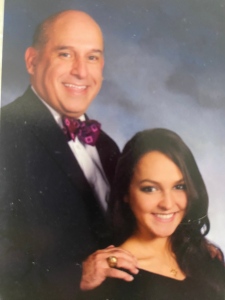
In years past, during what is supposed to be the season of light and wonder, I have written about Morgan, my daughter. About our traditions. About the ritual of choosing a Christmas tree, the inevitable frustration of getting it into the house, the way it would sometimes tip and fall, shattering irreplaceable ornaments, or dry out far too soon until it stood there, brittle and skeletal, a hollow reminder of that which was once was alive. Depression was inevitable.
And yet, every year, some type of life preserver manifested. A sign. A message. Always gentle. Always loving. Something that steadied me, strengthened me, urged me to keep going when I did not know how.
One year it was candles being lit across the world—not just for Morgan, but for all those lost to eating disorders and other invisible battles of the mind.
Sacred, silent evenings filled with remembrance and fragile hope. Tears shed in the dark. Songs whispered more than sung.
But not this year.
This year there was no message. No inspiration. No carefully chosen words meant to lift the spirit or point toward brighter tomorrows. I would not, could not, manufacture hope when I did not feel it myself.
Yes, traditions were still observed. The familiar Christmas movies played on cue, laughed at in some places, cried over in others. A beautiful tree stood glowing in the house.

Every room dressed for the season. We hosted extravagant gatherings, opening our humble home to many. The food was exquisite. The drinks flowed freely.
And yet something was missing.
Something intangible. Something incorporeal.
An emptiness. A darkness that wrapped itself around me and pulled slowly, relentlessly toward a deep well of despair. I felt myself drowning in heartache.
Perhaps it was the sharper reality settling in: that Morgan is truly, irrevocably gone from this plane of existence. She is forgotten. And forgotten by a community who should remember. Perhaps it was the growing, unavoidable realization that no matter how many facts are presented, no matter how often the truth is spoken, the eating disorder “community” is a lost cause.
Lost to corruption. To incompetence. To ego and tribalism. To misused funding, hatred, ignorance, and endless divisiveness.
My daughter Morgan and so many others seemed to have been taken in vain. And the community charged with caring simply did not care. We parents of children who have been taken are living reminders of the community’s greatest failure. And because of that, we are meant to be silenced. At any and all cost.
That so-called community now barely exists at all. Perhaps in name only. It has shattered itself against the rocks of politics and radicalism. And it makes one wonder whether any true community can survive when it attempts to include people of differing beliefs, faiths, and backgrounds.
And just when you begin to believe the answer is no something unexpected happens.
Something small. Something ordinary. Something that quietly, stubbornly brings the glimmer of hope for greater tomorrows.
I am the owner of a two-year-old Vizsla. If you know the breed, you know this is fifty-five pounds of muscle, speed, enthusiasm and intelligence … paired with an almost absurd need to be pressed against your side like living Velcro. This is Beauregarde:

Because Vizslas require exercise, constant, vigorous exercise, my significant other (who is nothing short of a saint) found a nearby dog park. And so, every morning at about 7:15 a.m., we take this wood-headed dog to the park.

There, he runs. He taunts other dogs into chasing him, fully aware he can outrun them all. He greets strangers with unfiltered joy, as if each one might be the most important person he has ever met. And the people at the dog park, each owned by their own dogs welcome all with open arms.
These dog park people come from every imaginable walk of life.
One served aboard a Navy destroyer during the Vietnam War. When his house burned this past March, people from the dog park wrapped their arms around him and his family offering help, presence, and compassion without hesitation.
Another is an aeronautical engineer who worked on some of the most advanced aircraft ever built, and who carries his Alabama roots with well-earned pride. The depth and range of his intellect are astonishing.
There are others who are owned by their dogs. A sound engineer. A lighting engineer who toured with internationally known rock stars. A person who did space planning and construction for high-end retail outlets, including Neiman Marcus and whose resemblance to Burl Ives is uncanny. A dear, dear woman whose larger-than-life husband was cruelly taken from her just twenty months ago. A salesperson for a major lumber retailer, a hardcore Dallas Stars fan, (envision Santa Claus about 200 pounds lighter) married to a wife classically trained as a singer and musician. Another who works security for school districts and private companies, and who has trained his dog for those very same protective tasks. There is a married couple—he a brilliant PhD in business, she with a rich history of national-level sports activity and a lifetime spent caring for animals of every kind.
And there is an incredible woman who has battled anorexia for more than thirty years—who carries that struggle every single day, and yet brings resolve, wisdom, and quiet reminders of perseverance simply by showing up.
All of these individuals, of different ages, races, political beliefs, upbringings, and life experiences have inexplicably found themselves drawn to one place.
A dog park.
Drawn there by love for their animals. And in that shared love, they learned to look past their differences … because what united them was so much greater than what could ever divide them.
And so, we took our dog park meetings to a higher level.
First, we met for drinks. Then for dinner. And this Holiday Season, we welcomed the dog park group into our home.
The laughter was constant. The conversations effortless. The warmth unmistakable.
And then came the moment that revealed, without question, just how real, how solid, how deeply bound this community truly is.
On a cold Monday evening in North Texas, unknown to us, strong winds blew open one of our fence gates. We let Beauregarde into the side yard, unaware that his path to freedom had quietly opened.
Ten minutes passed. Perhaps more. Then we realized he wasn’t in the house. A quick search outside revealed the open gate—and the awful certainty that he was gone.
We live in a dense residential area. Texas Department of Transportation records indicate over thirty thousand (30,000) cars pass through nearby streets every day! Coyotes and bobcats roam nearby creek beds.
In short, it was a recipe for disaster.
We jumped into the car, driving frantically through the neighborhood, calling his name, scanning every shadow and street corner. And then it struck me … The dog park people have a group text.
A frantic message went out explaining that Beauregarde had escaped and was missing.
What happened next overwhelmed me.
Instantly, messages poured in. How can we help? Where are you? We’re on our way.
Three people who lived closest to us immediately left their homes, getting in their cars, driving the neighborhood, or heading straight to our house.
And then less than ten minutes after the message was sent, a miracle appeared on my phone:
“I found him. I have Beauregarde.”
The woman who has fought anorexia for decades. The woman who has worked with horses and animals her entire life. The woman raised in Siberia, South Africa, and beyond, had found our wood-headed dog walking down the middle of a busy street.
When she called to him, he came to her immediately. And nothing could have been more symbolic than that reclamation of a lost loved one.
As I raced home for the reunion, a wave of relief and gratitude washed over me so powerful it was almost physical.
Soon after, one person from the dog park arrived at our house. Then another. And Beauregarde greeted each person with unrestrained joy—jumping, wagging, recognizing his people.
These were people who left their warm homes on a cold night. Who stepped away from their own lives to search for a dog. Who came without being asked, knowing full well the search might be fruitless.
They came because of community. Representing the very best in life.
We have so many differences. And yet none of that mattered. And it never has.
Because we were bound by something far greater than our differences. Something deeper than ideology or background or belief. Something strong enough to cut through despair and fear.
Perhaps that is where the answers lie.
Not in our differences.
But in embracing that which we share. In honoring our common humanity. In choosing love … again and again.
That night, we shared something sacred.
We shared our love.
We shared our community.




















